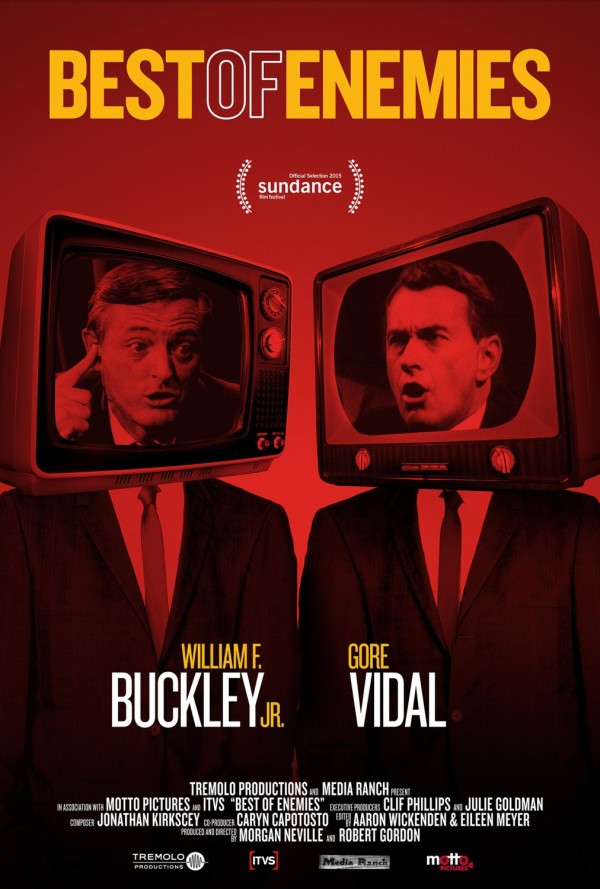BEST OF ENEMIES (2015, dir. by Robert Gordon and Morgan Neville, 87 minutes, U.S.)
![]() BY DAN BUSKIRK FILM CRITIC With protesters in the streets and culture wars on the front burner in the U.S., the moment captured in Robert Gordon and Morgan Neville’s new documentary Best of Enemies crackles with modern parallels. It’s the tumultuous summer of 1968 and the country is polarized between two Presidential candidates, the non-charismatic replacement for the slain Robert Kennedy, Hubert Humphrey and the reactionary conservatism of former Red-baiter, Richard Nixon. Desperate for ratings, the last place network, ABC decides to pair Left-leaning historian and author Gore Vidal and Conservative columnist William F. Buckley for a series of 10 debates over the course of the Republican and Democratic conventions. The snarling duo’s exchanges culminated in a legendary TV moment and the film makes a fascinating case that this hot-headed encounter ignited an angry tone of personal debate that has dragged our whole political system into blustering miasma of denial and ignorance.
BY DAN BUSKIRK FILM CRITIC With protesters in the streets and culture wars on the front burner in the U.S., the moment captured in Robert Gordon and Morgan Neville’s new documentary Best of Enemies crackles with modern parallels. It’s the tumultuous summer of 1968 and the country is polarized between two Presidential candidates, the non-charismatic replacement for the slain Robert Kennedy, Hubert Humphrey and the reactionary conservatism of former Red-baiter, Richard Nixon. Desperate for ratings, the last place network, ABC decides to pair Left-leaning historian and author Gore Vidal and Conservative columnist William F. Buckley for a series of 10 debates over the course of the Republican and Democratic conventions. The snarling duo’s exchanges culminated in a legendary TV moment and the film makes a fascinating case that this hot-headed encounter ignited an angry tone of personal debate that has dragged our whole political system into blustering miasma of denial and ignorance.
After a visually dazzling scene-setting opening, Best of Enemies settles into a smartly-crafted narrative, dissecting the moment and the characters involved. The film opines that part of the antagonism between the two may have been that their backgrounds were somewhat similar. Both Vidal and Buckley were highly-educated sons of privilege who became fascinated with how power was wielded. Separating them was the chasm of politics; where Buckley was an arch Conservative and founder of the influential The National Review, Vidal, the grandson of a Senator, was an openly gay novelist and playwright whose recent book Myra Breckinridge was awash in sexual provocation. ABC was sure that if they brought these two together sparks would fly, and they got that for which they had paid.
Co-director Neville is coming off the glorious 20 Feet from Stardom documentary and his co-director Gordon is an acclaimed musicologist who has done extensive work for PBS, so they know how to draw rich details from the history they’re exhuming. Equally as enthralling is the world of 60’s television, whose primitive technology casts its own spell as we enjoy the bumbling orchestrated by ABC execs (their entire convention set collapses in on itself at one point). It’s a tribute to the directors’ storytelling that they’re able to conjure an urgency and suspense out of an old story essentially about two wealthy white guys bickering.
Despite the film bending over backwards to be even-handed to Buckley, time has not bee kind to the ideas his reputation he built his reputation upon. It isn’t until we near the film’s climax that it finally illustrates Buckley’s most indefensible stands, his unapologetic belief in white superiority, class superiority, hetero superiority, and male superiority. While people extol Buckley’s articulate defense of Conservative values, it has become abundantly clear in the last 50 years that those same values stand on a foundation of fear, greed, and white lies. Buckley’s vaunted intelligence is shown to be little more than an actorly pose, with his plummy accent papering over the Trump-ish vulgarity of his repressive ideology. Vidal’s wit is more lavish and his anger toward Conservative indifference is just plainly more righteous, but he doesn’t slay the beast of Buckley by exposing his ugly soul. Instead, he does it by successfully encouraging Buckley to take the stand and testify against himself.
Buckley endured such public humiliations before (he debated James Baldwin in ’65, where an British audience actually scored their match at 540-160, winner Baldwin) and would face them again (in ’69 when Noam Chomsky devoured Buckley’s defense of the Vietnam War on the Buckley-hosted talk show, Firing Line) but with the rise of Reagan he finally found something to celebrate with his trademark villainous sneer. While Buckley defended the ruling class every week on the public’s dime on PBS, over time the medium devoted less and less time to Vidal’s unwavering defense of the underclass. (Vidal remained forever quotable. Comedian Greg Proops told a story on his 2012 podcast of Vidal leaving an ACLU audience dumbstruck with an aside about how he had orally-pleasured Congressmen in the cloakroom during his teen years as a page).
The film presents the debate’s outcome as a being a case of Buckley losing the battle yet winning the war. While the black cloud of Reagan’s revolution moved the dialogue away from Vidal’s politics, I’m not sure Vidal’s life (one of writing award-winning books on history and living with his longtime partner in a cliff house on the Amalfi Coast) was quite the bitter exile it is painted to be but here, which proposes banishment from television as every celebrity’s worst nightmare. A stronger case is made when Best of Enemies underscores how hijacking the nation’s discussion of the day’s burning issues and replacing it with petty personal blood sport has made all of us a loser.

